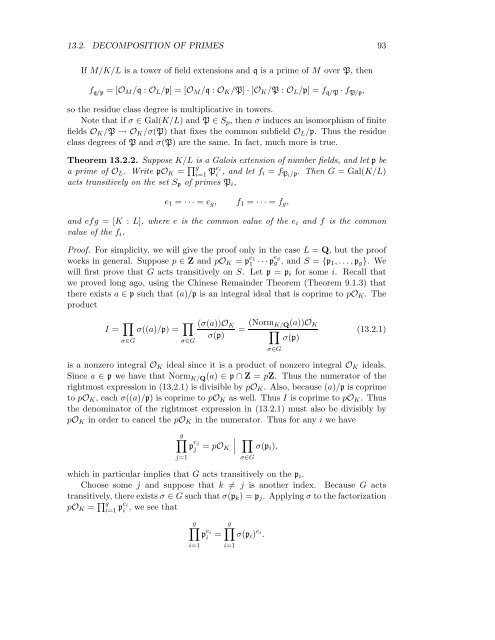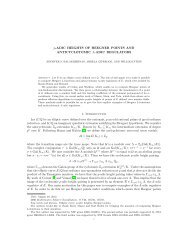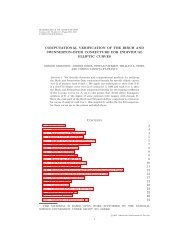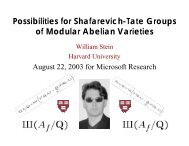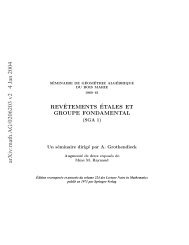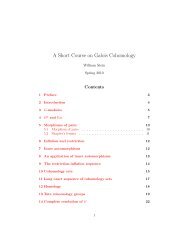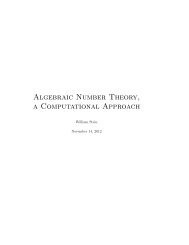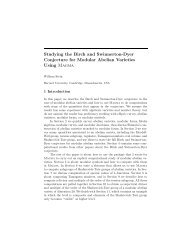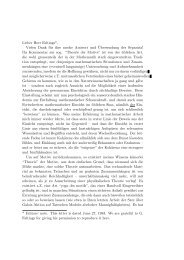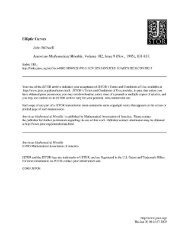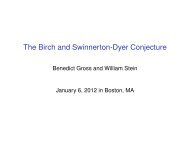A Brief Introduction to Classical and Adelic Algebraic ... - William Stein
A Brief Introduction to Classical and Adelic Algebraic ... - William Stein
A Brief Introduction to Classical and Adelic Algebraic ... - William Stein
Create successful ePaper yourself
Turn your PDF publications into a flip-book with our unique Google optimized e-Paper software.
13.2. DECOMPOSITION OF PRIMES 93<br />
If M/K/L is a <strong>to</strong>wer of field extensions <strong>and</strong> q is a prime of M over P, then<br />
f q/p = [OM/q : OL/p] = [OM/q : OK/P] · [OK/P : OL/p] = f q/P · f P/p,<br />
so the residue class degree is multiplicative in <strong>to</strong>wers.<br />
Note that if σ ∈ Gal(K/L) <strong>and</strong> P ∈ Sp, then σ induces an isomorphism of finite<br />
fields OK/P → OK/σ(P) that fixes the common subfield OL/p. Thus the residue<br />
class degrees of P <strong>and</strong> σ(P) are the same. In fact, much more is true.<br />
Theorem 13.2.2. Suppose K/L is a Galois extension of number fields, <strong>and</strong> let p be<br />
a prime of OL. Write pOK = g i=1 Pei<br />
i , <strong>and</strong> let fi = fPi/p. Then G = Gal(K/L)<br />
acts transitively on the set Sp of primes Pi,<br />
e1 = · · · = eg, f1 = · · · = fg,<br />
<strong>and</strong> efg = [K : L], where e is the common value of the ei <strong>and</strong> f is the common<br />
value of the fi.<br />
Proof. For simplicity, we will give the proof only in the case L = Q, but the proof<br />
works in general. Suppose p ∈ Z <strong>and</strong> pOK = p e1<br />
1 · · ·peg g , <strong>and</strong> S = {p1, . . .,pg}. We<br />
will first prove that G acts transitively on S. Let p = pi for some i. Recall that<br />
we proved long ago, using the Chinese Remainder Theorem (Theorem 9.1.3) that<br />
there exists a ∈ p such that (a)/p is an integral ideal that is coprime <strong>to</strong> pOK. The<br />
product<br />
I = <br />
σ((a)/p) = <br />
σ∈G<br />
σ∈G<br />
(σ(a))OK<br />
σ(p)<br />
= (NormK/Q(a))OK <br />
σ(p)<br />
σ∈G<br />
(13.2.1)<br />
is a nonzero integral OK ideal since it is a product of nonzero integral OK ideals.<br />
Since a ∈ p we have that Norm K/Q(a) ∈ p ∩ Z = pZ. Thus the numera<strong>to</strong>r of the<br />
rightmost expression in (13.2.1) is divisible by pOK. Also, because (a)/p is coprime<br />
<strong>to</strong> pOK, each σ((a)/p) is coprime <strong>to</strong> pOK as well. Thus I is coprime <strong>to</strong> pOK. Thus<br />
the denomina<strong>to</strong>r of the rightmost expression in (13.2.1) must also be divisibly by<br />
pOK in order <strong>to</strong> cancel the pOK in the numera<strong>to</strong>r. Thus for any i we have<br />
g<br />
j=1<br />
p ej<br />
j<br />
= pOK<br />
<br />
<br />
<br />
σ∈G<br />
σ(pi),<br />
which in particular implies that G acts transitively on the pi.<br />
Choose some j <strong>and</strong> suppose that k = j is another index. Because G acts<br />
transitively, there exists σ ∈ G such that σ(pk) = pj. Applying σ <strong>to</strong> the fac<strong>to</strong>rization<br />
pOK = g , we see that<br />
i=1 pei<br />
i<br />
g<br />
i=1<br />
p ei<br />
i =<br />
g<br />
σ(pi) ei .<br />
i=1


